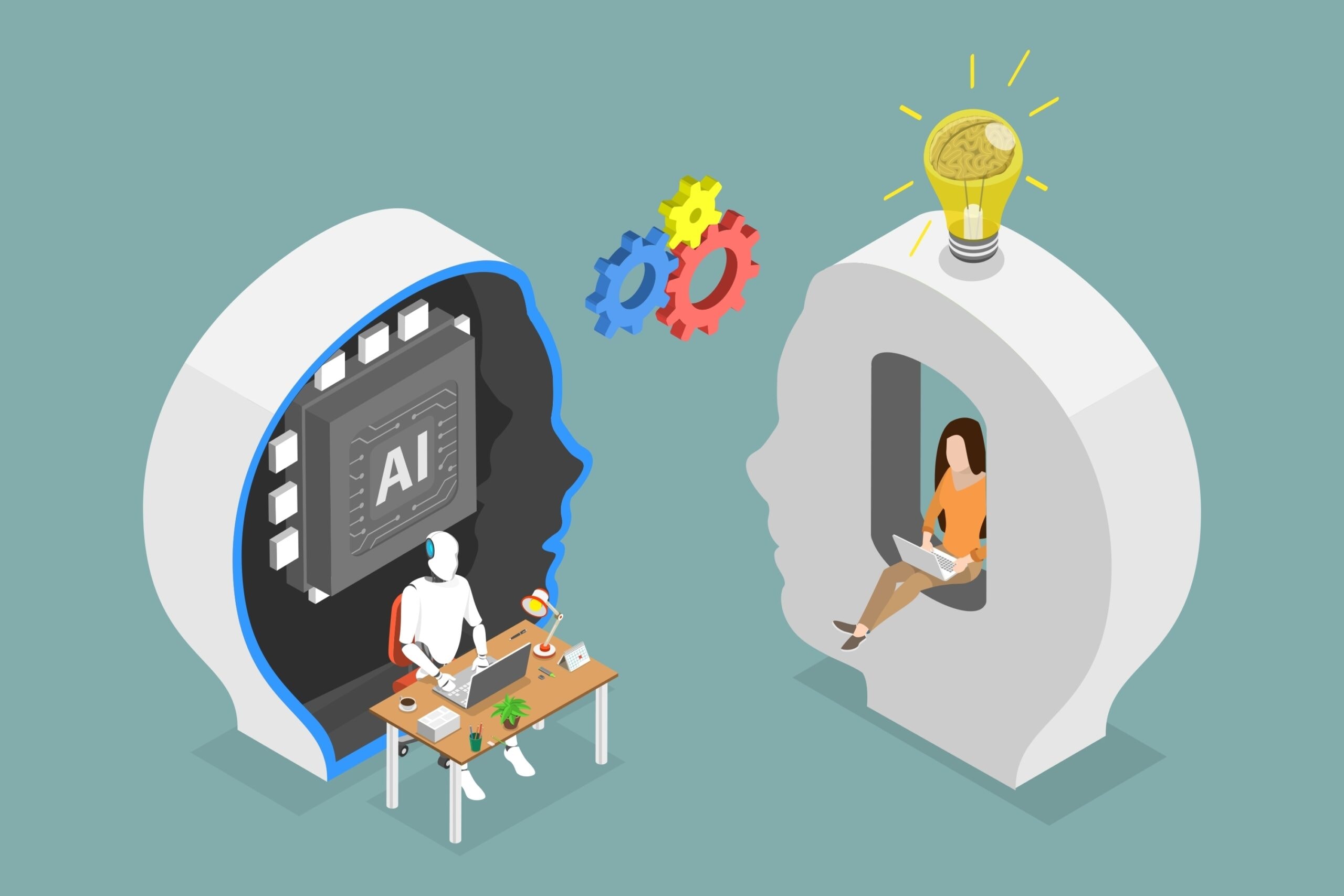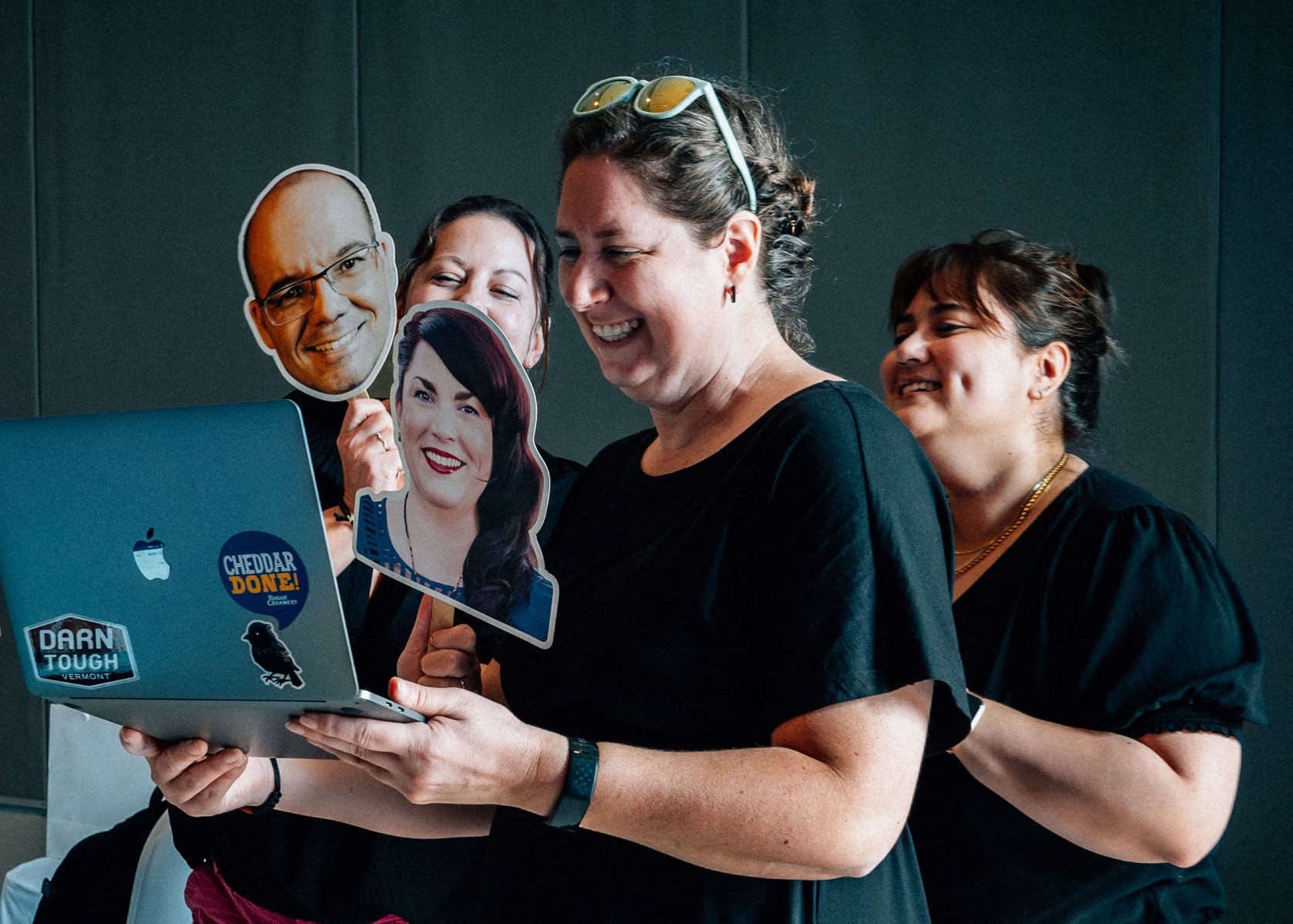A Conversation with Senior Developer, Sarah Lewis, on Liberating Teams from Tedious Tech Tasks
At Yoko Co, we're fortunate to have team members who don't just solve problems. They actively seek them out, especially when those problems involve repetitive work that sucks creativity dry and hampers productivity.
Sarah Lewis, one of our senior developers, has a particular passion for this. Any time a Yoko or client team member says, “I think I'm doing this the hard way,” or “there's got to be a better way to do this," Sarah sees that as her personal “bat signal.”
While she handles numerous technical responsibilities at Yoko Co, Sarah’s true mission lies in anything that takes tedious work off the plates of overworked humans. We sat down with Sarah to explore this passion and discover how her human-centered approach to automation is transforming the way our team and clients work.

A conversation with...
Sarah Lewis
Senior Developer
Yoko Co
Yoko Co: What first sparked your interest in automating repetitive tasks?
Sarah Lewis: I've always been like this. I'm a person who likes to optimize things. I will spend way too much time figuring out a better way to do something than the time it actually saves me sometimes. But I find it so fun to figure out a better way to do things.
I think it's one of the ways my ADHD manifests. I really don't like doing repetitive tasks, so I assume other people don't like them either, which is interesting because that turns out not always to be true. One of my sisters will do repetitive, structured things all day long with no problem. I not only don't want to do repetitive tasks, I'm compulsive about finding a different way as soon as I notice a pattern. I ask, 'Why am I doing this by hand?'
I do this naturally for myself, but I realized not everyone has the mindset or technical skills to do something about it. That's where I love coming in and fixing things. It's the best way to be a hero, saving somebody from tedious tasks.
Beyond efficiency, how do you see automation as a tool for human flourishing? What becomes possible when people are liberated from repetitive tasks?
It frees up something I learned about recently, called 'cognitive surplus,’ which suggests that when your basic needs are taken care of, you have the mental bandwidth to pursue bigger things.
I've seen it in myself. A lot of what I consider intrinsic to who I am - my creativity, problem-solving, confidence, trying new things - come alive when I have cognitive surplus. When I'm maxed out with no downtime, I lose all that. I get by, but I don't generate new ideas or get excited about things.
When people are maxed out by unnecessary things, we're losing all this potential they could bring not only to their work but their whole world. That's incredibly motivating to me - freeing people from tedious tasks sounds dramatic, but these tasks really do hold people down when we have enough of them.
The more I can free people to do the genius thing they're here for - designers designing, project managers communicating - versus admin tasks they don't enjoy, the better. The knock-on effects are tremendous when people spend more time on valuable work that uses their skills.
When people are maxed out by unnecessary things, we're losing all this potential they could bring not only to their work but their whole world. That's incredibly motivating to me - freeing people from tedious tasks sounds dramatic, but these tasks really do hold people down when we have enough of them."
Sarah Lewis

The Methodology Behind Effective Automation
What's your process for identifying "automation-worthy" tasks? What criteria do you use to determine if something should be automated?
It's not all about efficiency for efficiency's sake. I think doing the wrong things efficiently is a losing proposition, so it always needs to serve a strategy. I try to be conscious of not optimizing something that shouldn't be done at all. But if I'm doing a necessary task, I want it done as quickly as possible toward its aim.
Sometimes I have an instinct to automate something and then find my automation would harm its purpose. For example, our project managers send weekly reports to clients, which takes time. My inner automator immediately thinks, 'That sounds horrible, I could make this faster.' But when talking to the team, I learned that the process of reviewing everything slowly is what makes it useful. Automation can help gather information from disparate sources, but the task shouldn't be fully automated because you'd lose some of the benefit.
Could you walk us through your approach to one of your most successful automation projects from identification to implementation?
It usually starts with identifying a problem. Often the people suffering most aren't aware there's another option. It's not usually someone asking me to automate something; it's me hearing about a frustration or noticing someone's spending way too much time on something.
Take the new 301 project I’m working on, for instance. Diane, our senior project manager, mentioned after launching a client website that they'd missed a bunch of 301 redirects in their scrape, and now users were hitting 404 errors. I started asking how long they usually spend on these per project and discovered it's a task no one enjoys. It's a combination of high stakes and low interest, the worst of both worlds.
I learned more by asking details about the specific challenges. In this case, we needed to figure out how to add new URLs as we discovered them without duplicating effort, tracking which ones had been added, identifying 404 errors, and finding better ways to source the data.
We also implemented an automated way to catch cases where redirects are going in loops and adding verification to check if redirect targets are actually working pages
All these improvements make both the human burden less and the process stronger and more resilient. I'm also working on identifying similar URLs to help humans make consistent decisions more efficiently.
It's a broad, multidisciplinary approach that starts with observation, breaks down the problem, solves each piece, and builds it into a usable system through both processes and technology.
Can you tell us about the "Content Corral" solution you developed? What human problem was it solving, and what was the impact?
In broad strokes, for many of our websites, we need content that's critical to the site's success. Sometimes it's from an existing site, sometimes it's new. We have processes for planning and auditing content, but it's usually a struggle on almost every project to get content into the website in a reasonable time.
One challenge was that our content gathering required rework. People would get content from one place, put it in a document, finesse it there, and then copy it into the website. We had a whole phase just for deployment, primarily about taking content they'd already gathered and putting it somewhere else.
I realized we're building websites on WordPress, which is literally a content management system. Why not use WordPress to gather content from the beginning? This eliminates rework of gathering content in one place then moving it to another.
Now on projects using Content Corral, we set up the content management part of the website much earlier. While we're still working on design and development, the backend where content can be entered is already available. We've added tools to track content status, showing where it is in the process. And then the client reviews it to ensure it's current and addresses user needs, and our team reviews it to ensure it's ready for the website.
This allows content work to happen simultaneously with other processes instead of being a huge lift at the end of the project. It streamlines the process and saves our clients' teams time, making website launches a lot less painful.

Human-Computer Partnership
How do you balance automation with maintaining human agency and control? Are there risks of over-automating?
Use humans for what humans are good at and computers for what computers are good at. It reminds me of XKCD comics about passwords. We tend to make passwords that are hard for humans to remember and easy for computers to crack, rather than the opposite. Our instincts are often ridiculous; we keep trying to make humans serve computers instead of accurately identifying human versus computer skills.
The biggest thing is keeping your actual goal in mind. If a potential automation degrades anyone's experience, you probably shouldn't do it. For example, using AI responses for support queries might save time but give members worse responses. Your time savings comes at their expense, which is no good.
With the Content Corral or the 301 redirects, my goal isn't just to replace tedious work but to make the process work better. It helps people do their jobs better, enjoy what they're doing more, and get better responses.
If an automation is frustrating to use or creates a worse experience for members or staff, that's a nonstarter. Everyone should benefit - there should be no losers.

Practical Applications and Future Directions
What are some "low-hanging fruit" automation opportunities that many organizations overlook?
One area is support requests. Pay attention to what questions people are asking frequently. It can illuminate what could be automated or improved. These patterns show what's not working well on the website and where you could make communications improvements.
Another area is email communications. Many organizations use generic out-of-box messages. Writing better email sequences is a one-time investment that pays future dividends. For associations, instead of just sending 'You're now on our newsletter,' send something that points people to useful parts of the website.
There's also potential in personalization if you have information and observable behavior on the website - you can use automation to help people find content they're interested in.
AI tools like ChatGPT can be useful as a starting point for writing content (not an endpoint). They can help combat the 'curse of knowledge' where you're so familiar with your topic that you forget website visitors don't know it, and what seems obvious to you isn't obvious to them.
Another opportunity is connecting systems. It's annoying when websites ask you to fill in the same information multiple times. Tying platforms together with tools like Zapier or IFTTT can help without requiring technical expertise.
For my local woodshop nonprofit, we're working on an automation where people can scan a QR code, fill out a form to upload images of their woodwork from their phones, and those images automatically go into the association's Google Photos through Make.com. This removes friction for members to share content.
The hint is when you think 'there's got to be an easier way' or when you're manually transferring information between systems–those are signs an automation is possible.
How do you see the relationship between AI and workflow automation evolving in the next few years?
One thing that has stuck with me is: it's your job to be good, and it's the AI's job to be fast. The AI can't take over parts requiring thoughtfulness and keeping goals in mind. That's your job. But AI serves well at being fast.
It's up to humans to identify where speed could help humans. By being good at your job, whether that's customer service or something else, you're in a position to think about how AI could help you. If you don't know how to do your job well, AI won't be very useful.
As a developer, I use AI to help with tedious aspects of coding, but it only works because I know what I'm doing and can assess whether its responses make sense. You can get into trouble using AI without knowing what you're asking for or what to expect.
It works best when you make a request knowing what it should result in and can assess whether the response is good. If you don't have expertise to assess responses, it usually doesn't go well.
If readers take away just one thing from this conversation about human-centered automation, what would you want it to be?
Know what your goal is and keep the big picture in mind. All your automations should serve your important real goals. And if you're saying 'Why is this so hard?' it probably doesn't have to be. (Unless it's existential dread, in which case, good luck.)

Meet Sarah
The Human Beyond the Code
Fun fact: My hobby is collecting hobbies. If you talk to me any week or month, what I'm specifically doing is usually new and different. This month it's making looms for weaving.
Claim to fame: I'm really good at winning radio contests. My best prize was a trip to Cancun with my mom. My maiden name is Kramer, and they instituted what they called the 'Kramer clause.’ You could only have one winner per household per month because we dominated the contests so much.
At Yoko Co, Sarah's human-centered approach to automation exemplifies our commitment to creating technology that serves people, not the other way around. By liberating teams from tedious digital tasks, we help unlock the cognitive surplus that drives creativity, innovation, and meaningful work.
To learn more about our approach and how we can help your team, get in touch.
